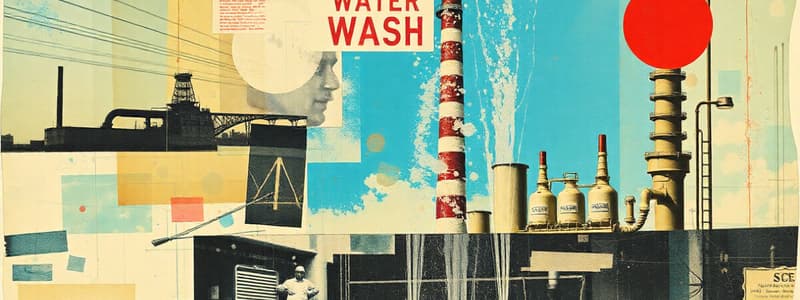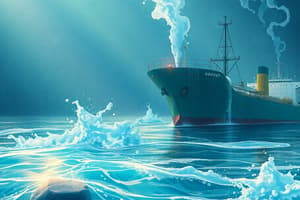Podcast
Questions and Answers
What is the purpose of P-350A/B pumps in the water wash process?
What is the purpose of P-350A/B pumps in the water wash process?
The P-350A/B pumps circulate a heated water wash stream from D-350 to mix with the hydrocarbon stream.
How is the water wash stream heated before it mixes in M-350?
How is the water wash stream heated before it mixes in M-350?
The water wash stream is heated by 100 psig steam in the shell side of E-350.
What happens to the vapor hydrocarbon in T-350?
What happens to the vapor hydrocarbon in T-350?
In T-350, the vapor hydrocarbon rises and is scrubbed with process water to remove caustic and minimize liquid hydrocarbons.
Where does the vapor hydrocarbon go after exiting T-350?
Where does the vapor hydrocarbon go after exiting T-350?
What is the role of E-351 in the water wash process?
What is the role of E-351 in the water wash process?
What happens to the liquid phases after passing through M-350?
What happens to the liquid phases after passing through M-350?
What is redirected to the Oily Water Sewer after D-353?
What is redirected to the Oily Water Sewer after D-353?
What does E-351B do when E-351 is offline?
What does E-351B do when E-351 is offline?
What is the destination of the skimmed hydrocarbon after processing?
What is the destination of the skimmed hydrocarbon after processing?
What is the significance of the three-phase stream in M-350?
What is the significance of the three-phase stream in M-350?
Flashcards are hidden until you start studying
Study Notes
Hydrocarbon and Water Wash Stream Process
- The skimmed hydrocarbon stream from D-340 (Caustic Wash Settler) and water from T-340 (Caustic Wash Vapor Scrubber) are combined in M-350 (Water Wash Static Mixer).
- P-350A/B (Water Wash Circulation Pumps) circulate heated water wash stream from D-350 (Water Wash Settler) to M-350.
- Heating occurs in E-350 (Water Wash Heater), where water is heated by 100 psig steam on the tube side.
- The three-phase mixture from M-350 is directed to the bottom of T-350 (Water Wash Vapor Scrubber) for further processing.
Vapor Hydrocarbon Scrubbing
- In T-350, vapor hydrocarbons separate from liquid phases and pass through a packed bed for scrubbing with process water.
- The scrubbing process eliminates entrained caustic and aluminates, reducing liquid hydrocarbon contamination.
Vapor Cooling and Liquid Separation
- Vapor hydrocarbons are cooled in E-351 (Water Wash Vapor Cooler) using cooling water on the tube side, condensing the vapor's water content.
- Cooled vapor is transported to D-360 (Booster Cylinder Suction Drum) for further processing.
- E-351B acts as a backup and is activated when E-351 requires maintenance or cleaning.
Waste Management
- Liquid phases fall into D-350 (Water Wash Settler) for separation.
- Most water from the settler is recycled back by P-350A/B for re-mixing with hydrocarbons.
- Wastewater is transferred to D-353 (Waste Water Degassing Drum) before being discharged into the Oily Water Sewer (OWS).
Hydrocarbon Routing
- The skimmed hydrocarbon from the separation process is routed to the Debutenizer System for further refinement.
Studying That Suits You
Use AI to generate personalized quizzes and flashcards to suit your learning preferences.




